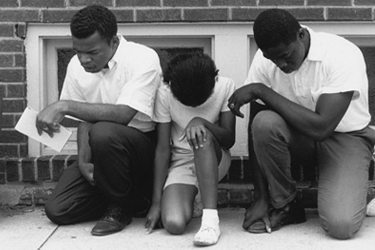Justice is Love Made Public
Too often, "love" and "justice" are understood in completely different categories. In fact, they are just different incarnations of one another.

For the past couple of years, my faith community of Unitarian Universalists have been focusing on Valentine’s Day not as a day of romance and sentiment, but as a day to reflect on love and justice. Too often, “love” and “justice” are understood in completely different categories. In fact, they are just different incarnations of one another.
“Justice is what love looks like in public” says Rev. Dr. Cornel West. “Catastrophic love” is what West names the social justice work of 19th century abolitionists and 20th century civil rights activists in response to the violence, poverty, and systematic degrading of Black folks. As West puts it:
What was the response? It wasn’t to create a black al Qaeda. It wasn’t counterterroristic. In the face of slavery, Frederick Douglas said what? With a smile and wounds, we want freedom for everybody. We don’t want to enslave others just because we’re enslaved. Jim Crow — we have no rights and liberties; we’re civically dead — we want rights and liberties for everybody. We don’t want to Jim Crow somebody else. The Blues responds to the catastrophic with compassion, without drinking from the cup of bitterness — not with revenge but with justice.
The response to catastrophes, according to West, was love, justice, and beauty (in the form of the Blues.)
Since I heard that about Planned Parenthood’s announcement to abandon the labels ‘pro-choice’ and ‘pro-life,’ some things have been bothering me. For YEARS, folks inside the reproductive health, justice, and rights movements have been advocating for more nuanced and complex messaging from the big reproductive rights organizations. Since the 1980’s, activists and advocates of color have been sharing their wisdom about the inadequacies of the over-simplistic binary of pro-choice vs. pro-life frame. And yet, in Planned Parenthood’s announcement, I only heard mention of their “exhaustive research;” that their recent revelation about the “complexity and nuance” of pregnancy decisions was rooted in recent polling. Perhaps within this term of “exhaustive research” they include the MANY conversations and all of the dialogue that has gone on within the movement for reproductive freedom. But in the history of progressive social movements, there is a long tradition of predominantly White leadership using the wisdom and resources of communities of color without express acknowledgment (or gratitude). I know that those leading this change within Planned Parenthood have only good intentions. I’m sure that it was the empirical research that finally convinced them to abandon the pro-choice and pro-life labels. And I am ever so grateful for the important work of Planned Parenthoods across this country and their messaging shift that embraces messiness and complexity. However, I also know that the good intentions, ignorance, and empirical-mindedness of White liberals (of which I am one) have caused quite a bit of harm in this nation’s history.
An excerpt from Dr. Martin Luther King’s 1963 Letter from a Birmingham Jail:
Over the past few years I have been gravely disappointed with the white liberal. I have almost reached the regrettable conclusion that the Negro’s great stumbling block in his stride toward freedom is not the White Citizen’s Counciler or the Ku Klux Klanner but the white liberal, who is more devoted to “order” than to justice; who prefers a negative peace, which is the absence of tension, to a positive peace which is the presence of justice.
And what is justice? “Justice is what love looks like in public.” We do not live our lives between an isolated self and a doctor. Love is not just a romantic sentiment decorated with roses, chocolates, and balloons. Love is robust, political, and powerful. Love can easily hold the messy nuance and complexity. Love has no problem going public. Love does not mind offering an apology and expressing gratitude. Love does not have a problem standing its ground for what is boldly compassionate and uncomfortably true.
There have been any number of catastrophes in these past 40 years since the Roe v. Wade decision. One of the biggest, in my opinion, was the 1977 Hyde Amendment and subsequent yearly congressional approval of this amendment which denies abortion-care coverage to low-income women on Medicaid. Representative Henry Hyde is on the recording saying “I would certainly like to prevent, if I could legally, anybody having an abortion: a rich woman, a middle class woman, or a poor woman. Unfortunately, the only vehicle available is the [Medicaid] bill.” “Unfortunately,” Hyde could only get to the poor women. The pro-choice movement has not significantly mobilized around Hyde until recently. Perhaps it was not politically feasible and it is naiveté to suggest otherwise.
I was not part of the movement for reproductive freedom in 1970’s, 1980’s, or the 1990’s (here I supposed I should confess I can be categorized as a “Millenial”). I was not part or privy to how and why the political and strategic decisions were made the way they were. But I have inherited the stories. I have inherited the sadness, anger, gain, grief, and frustration. I have bore witness to folks of color in the reproductive freedom movement who were repeatedly (often unintentionally) dismissed and ignored.
On this Valentine’s Day, I ask those of us dedicated to reproductive freedom and justice: how can we embody, West’s “Catastrophic love?” Can we respond to the “catastrophic with compassion, without drinking from the cup of bitterness — not with revenge but with justice?” Can we make our love public?

